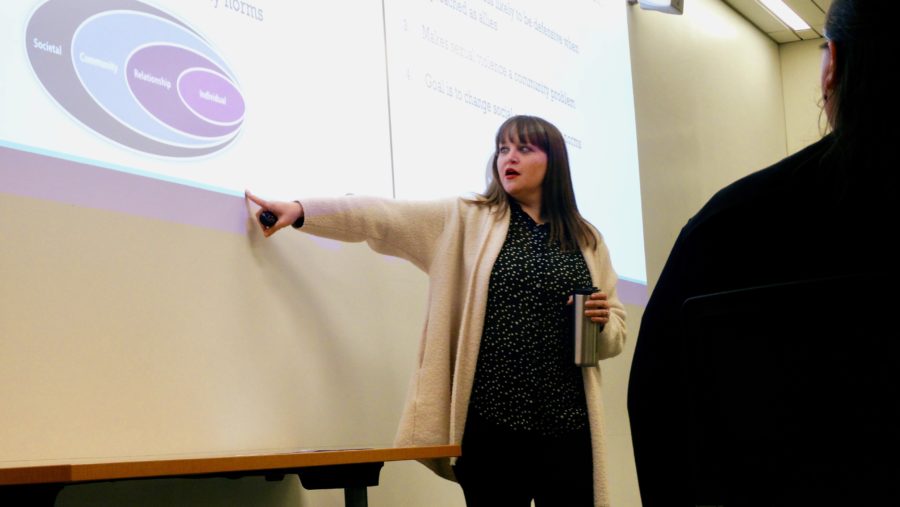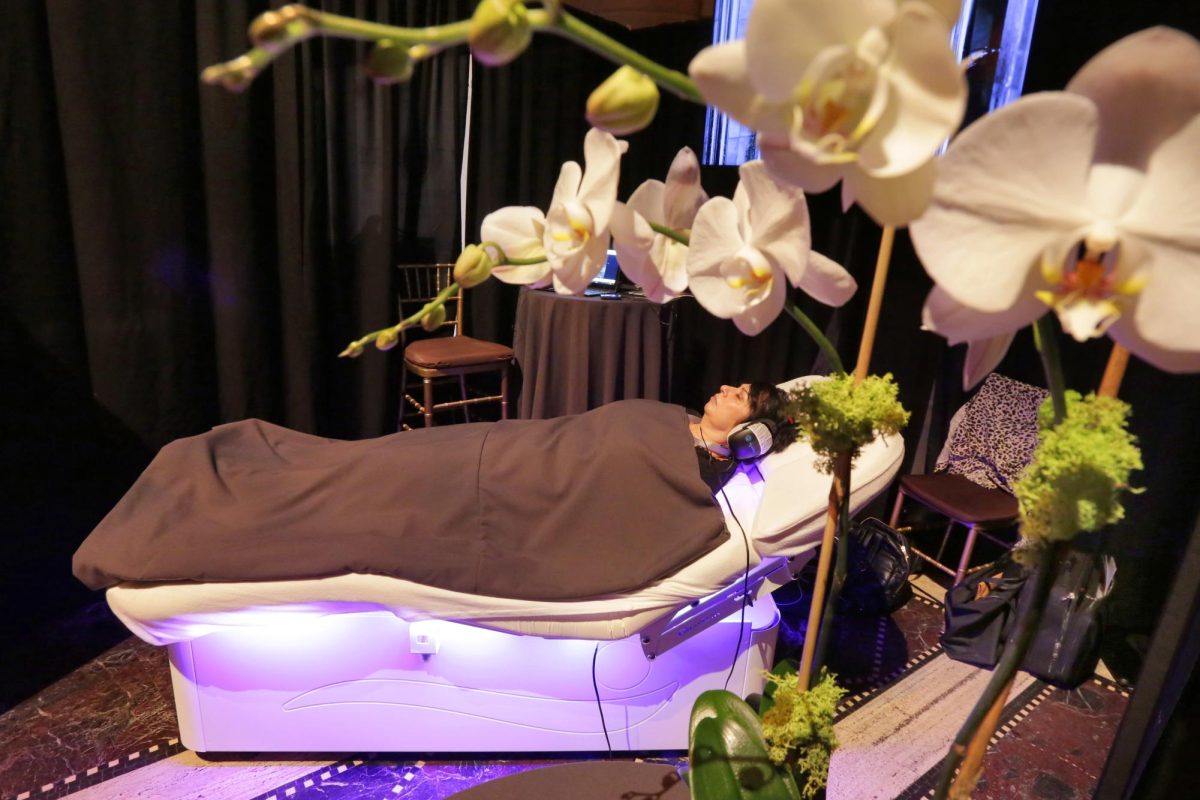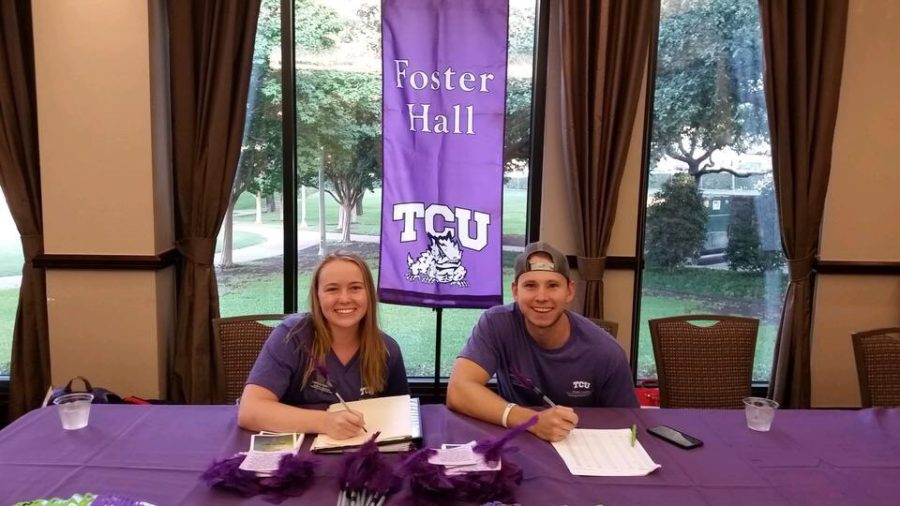Long after they’ve begun to handle their trauma, some survivors of sexual assault at TCU return to help the Title IX advocate who became a part of their healing journey.
One came back to help with the online presence. Another volunteers her artistic skills.
Leah Carnahan, the assistant director of Title IX advocacy and education, said they returned because they felt cared for and supported during a time of crisis.
That’s the goal of her office — she strives to make sure survivors are heard and respected.
Carnahan said when students come to her first-floor office in Jarvis Hall, her goal isn’t to tell them what to do. Instead, she said she works to empower them to make the choice they feel is best for them.
“It’s not what your friends think. It’s not what your parents think,” Carnahan said.
Coming from a position in the office of Campus Life, Carnahan has a deep understanding of the administrative and legislative processes involved in reporting allegations of sexual assault or misconduct. Therefore, she was required to report any allegations of sexual misconduct or assault to TCU’s Title IX office.
This meant students could be thrown into a university process without understanding all of their options or rights. In 2016, TCU’s Title IX office, which handles charges of gender discrimination, created an advocacy position to provide students with a confidential resource who knows the intricacies of the reporting process.
“Most students deal with ‘What do I want to do? How do I want to handle this?’” said Dr. Darron Turner, TCU’s Chief Inclusion Officer & Title IX coordinator. “I think that’s always a struggle.”
Prior to 2016, counselors and those in the health center were the only confidential resources who weren’t required to report allegations. However, their focus on counseling and treatment often meant they didn’t have a deeper understanding of the administrative and legislative processes involved in reporting allegations of sexual assault or misconduct.
Turner said Carnahan was the perfect fit for her position because of her passion and expertise in the area. He said he refers students to her office on a regular basis.
Empowering Grace
It happened in her dorm room.
Grace, who asked that her real name not be used, was a first-year student. She was hanging out with a trusted male friend in her dorm room. Her roommate was asleep in the other bed when things spiraled.
First he pressured her for a kiss, then he shoved her hand down his pants forcing her to touch him. After, she fled her room and stayed with a friend. In the morning, she and her friends realized “that” was sexual assault.
She couldn’t face going back to her room. Instead, she talked to a resident assistant and hall director and was referred to Carnahan.
Two years later, Carnahan is still one of her “go-to people.”
“We have such a good connection,” Grace said.
Grace worked with Carnahan to figure out her options:
- Make a police report, which could
lead legal action. - Make a Title IX report, which could result in university discipline for the young man.
- Get a no-contact order through the university, effectively barring the young man from interacting with her.
Grace said Carnahan equipped her to make her decision about whether to report the assault. She felt confident waiting until winter break to tell her parents about her assault, even though it happened before Thanksgiving.
Grace said she didn’t want her choice to be impacted by their influence.
Linda Wolzon, the director of counseling and mental health at TCU, said she refers cases to the confidential advocate because Carnahan invests her time in guiding students through the available choices without pressuring them. Wolzon said survivors are often pressured by well-meaning loved ones.
“They don’t need that from us,” Wolzon said. “It’s really about finding out what would empower you right now.”
Giving Faith
When students come to Carnahan she listens without passing judgment. Most importantly, she believes them.
Feeling validated by someone advocating for them can help survivors start to heal, according to Katherine Collier Esser, the assistant director of research and training services at the Tarrant County Women’s Center.
Wolzon added that being violated during an assault is already isolating. Not being believed can be almost as traumatic as being assaulted. It cuts survivors off from the source of human empathy and connection they need in order to heal.
Feeling heard is healing, Collier Esser said. She said the
Faith, whose name has also been changed to protect her privacy, was raped. She told her attacker—someone she met at a party—no three times. She expected no sympathy. She had been in groups where instead of sympathy, young women were ridiculed and blamed.
Carnahan was the first person to make her feel supported.
“She’s that person who’s going to listen to you,” Faith said. “She’s going to make you feel heard.”
More than a job
Feeling heard is the first step in a survivor’s healing journey after their trauma. Collier Esser said when survivors feel believed, it helps their body ease out of its constant state of fight or flight.
Grace said she still has moments where her post-traumatic stress disorder impacts her.
“It’s crazy how our body reacts,” she said. “It can get you out of nowhere and bring you right back.”
Knowing the impact the emotional stress has, Grace said her professors told her they were surprised she stayed at TCU. The scholarship office was shocked her GPA was above a 3.0.
Helping survivors fulfill their goal of continuing their education is what Carnahan is there for, she said. Seeing students she helped graduate and succeed is rewarding. Turner said the deeper meaning she gains from her work is why Carnahan excels at her position.
“It’s not about just having a job,” he said. “She feels it.”
But Carnahan said she doesn’t feel she deserves all the credit for survivors’ healing.
“It’s never about me,” Carnahan said. “It’s about supporting them. It’s about being there when they need it and helping them celebrate when they get there.”







